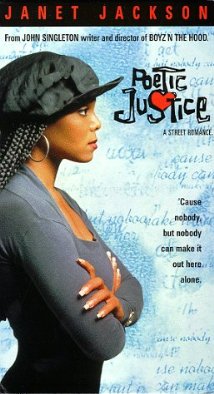
POETIC JUSTICE
US, 1993, 109 minutes, Colour.
Janet Jackson, Tupac Shakur, Regina King, Maya Angelou.
Directed by John Singleton.
Poetic Justice is the second feature film by African- American director, John Singleton, who made a breakthrough the year before with Boyz in the hood. Was to go on to make Higher Alerting, Shaft, Four Brothers. He was in preparation for a film, Tupac, based on the life of the wrapper.
This film was also a star vehicle forward Janet Jackson. While she was to continue her career as a singer, it did very little for her film career, even earning her a not undeserved Razzie nomination as worst actress of the year.
But, whatever the quality, the film is interesting as a star vehicle for Tupac Shakur who was to be murdered in 1996 at age 25., which meant that he appeared in few films, Juice, Gridlock’d, Gang Related. But there were several films about him and his death, The case was studied in Nick Broomfield's Biggie and Tupac.
Some American bloggers have found this film interesting and to their taste. Others may find it very distant, a 1990s picture of Africa- Americans in Los Angeles with not such interesting characters and interactions. The film is slowly-paced. And while there is some drama, especially a brawl and a murder at the beginning, it is more sedate that might have been expected.
The film opens curiously at a drive-in with a melodrama screening starring Billy Zane. The action then moves to Justice, Janet Jackson, and her boyfriend who is then picked on by a group and killed in a brawl. Justice, writes poetry, gives up her studies and decides to be a hairdresser in the city. There she meets a number of potentially interesting characters, the stylish owner of the shop, the gay friend, the other members of the staff, the customers.
One of the staff, played by Regina King, persuades Justice to go with her on a trip to Oakland and a Festival in a mail truck. Regina King is going with her husband – lovey-dovey at times, quarrelling at others. But the driver is someone Justice has encountered before, and not in a friendly way. She is petulant, argumentative, gets out of the truck but is persuaded to continue. As she continues to talk, she finds that she and the driver have more in common that they thought. Audiences have seen the driver with his wife, their clash, his walking out and taking a child with him.
Justice continues her poetry. In fact, the poetry was written by famed Maya Angelou, the celebrated poet, who appears here as Aunt June, who has a lot of wise words to say about the self-centredness of the younger generation and of undisciplined children – something which is continually relevant.
One of the difficulties with Janet Jackson’s performance for many audiences is that she is continually chewing gum, which does not quite tie in with her image of being sensitive and our poet.
This is a picture of a particular time and place, a time of crisis, just after the Rodney King riots. In that sense, it is interesting to view in retrospect, while not being as interesting or is entertaining as might be hoped.